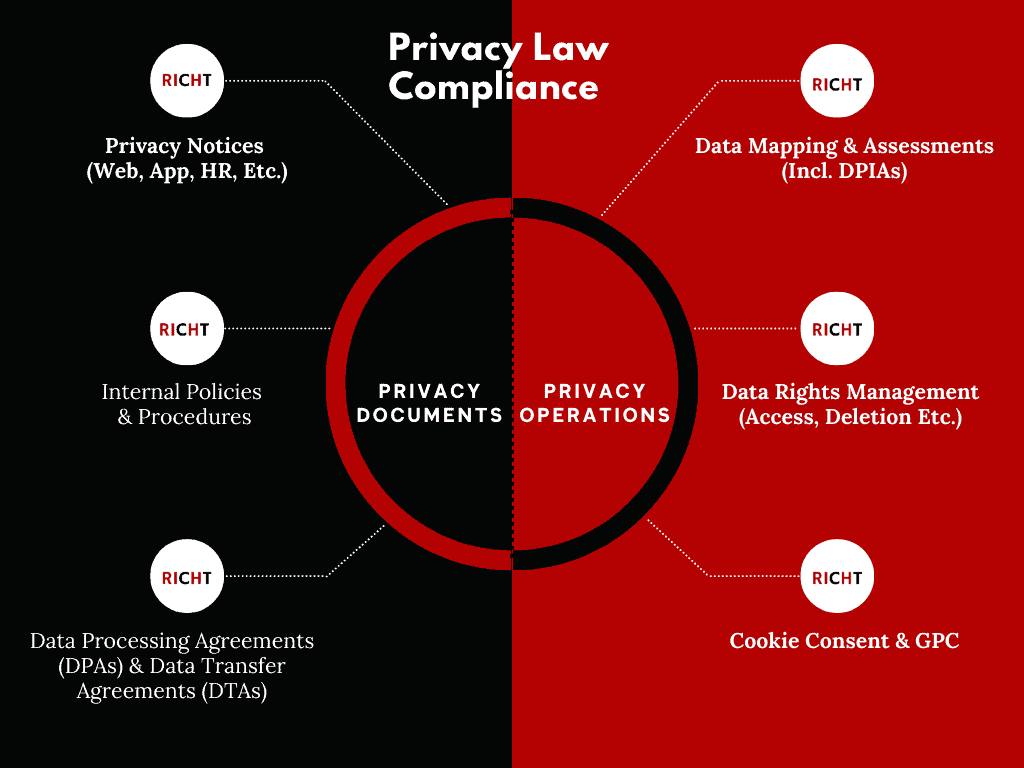Privacy policies are a cornerstone of compliance in today’s rapidly evolving legal landscape. As privacy laws continue to expand at the state, federal, and international levels, businesses face increasing complexity in meeting their legal obligations. Whether you need a privacy policy for your website or app, working with a Privacy Policy Lawyer ensures your business is protected against legal risks while building trust with your customers.
Why You May Need a Privacy Policy Lawyer
The privacy law landscape is dynamic and multifaceted. From international regulations like the General Data Protection Regulation (GDPR) in the European Union to U.S. state laws such as the California Consumer Privacy Act (CCPA) and its amendment, the California Privacy Rights Act (CPRA), businesses must navigate a maze of legal requirements. Additionally, sector-specific laws like the Children’s Online Privacy Protection Act (COPPA) and health privacy laws add another layer of complexity.
A generic or templated privacy policy often fails to address these nuanced legal requirements, leaving businesses exposed to potential fines, reputational damage, or consumer lawsuits. Further, with tools such as privacy scanners proliferating, the risks of third parties uncovering non-compliance are increasing.
Even for companies with significant resources, the privacy compliance landscape is confusing, and accounting for all of the relevant legal considerations, including where there are complex data flows, can result in both financial and reputational harm. For example:
- TikTok was fined £12.7 million for processing children’s data without parental consent.
- Sonos faced public backlash over changes to its privacy policy despite its assurances of data protection.
- Miscommunication of terms by Adobe Systems Inc. led to customer anxiety regarding generative AI practices.
These cases highlight the importance of having a custom-drafted privacy policy tailored to your business’s specific needs.
The Benefits of Working with a Privacy Policy Lawyer
As experienced privacy lawyers focused on website and app privacy compliance, we offer:
- Custom Privacy Policies: Tailored to your business and drafted by an attorney focused on privacy law.
- Terms & Conditions: Comprehensive agreements that complement your privacy policy for full compliance.
- Cookie Compliance: Cookie banners and related consent and compliance are highly intertwined with a privacy policy, and we ensure that clients have proper interoperability between cookies and their privacy policy.
- Regulatory Guidance: Assistance in responding to consumer privacy requests (e.g., access or deletion rights) or regulatory inquiries.
- Flat-Fee Pricing: Affordable solutions like our PrivacyExpress™ service ensure compliance without breaking the bank.
Unlike automated tools or free templates, we provide clarity by eliminating overbroad or irrelevant terms that could expose your business to unnecessary risks.
Stay Ahead of the Privacy Law Curve: Protect Your Business with Confidence
In 2024, nearly 40% of U.S. consumers will be covered by comprehensive state privacy laws. This means more businesses than ever will need legally compliant privacy policies to avoid penalties and maintain consumer trust. With our tech-savvy approach, we not only draft policies but also audit existing ones to ensure they meet current legal standards.
By partnering with a seasoned Privacy Policy Lawyer, you gain peace of mind knowing that your website or app complies with all applicable laws, from GDPR and CCPA/CPRA to emerging regulations across the U.S. and beyond. There are a variety of benefits of purchasing a custom privacy policy drafted by a lawyer beyond just the actual privacy policy. For example, a privacy lawyer’s role includes ensuring that the privacy policy and related online agreements, such as terms and conditions, are properly consented to and hence enforceable. Choosing the optimal data privacy management and related consent platform is also key in ensuring a best-in-class privacy compliance program that not only wins customer trust but also avoids enforcement actions that are based on improper privacy tool operationalization.
Contact Us Today
Don’t leave your business exposed to legal risks or reputational harm caused by inadequate privacy policies. Contact us today to schedule a consultation and learn how we can help you protect your business with a custom-drafted privacy policy.
What Should a Privacy Policy Include?
A privacy policy is a legal document that informs users about how their personal information is collected, used, shared, and protected. While the specifics of a privacy policy vary depending on the business’s operations, industry, and applicable laws (e.g., GDPR, CCPA/CPRA), certain key elements are commonly included. Below is an overview of what your privacy policy may cover:
- Types of Personal Information Collected
- Examples: Names, email addresses, IP addresses, payment details, browsing history, or sensitive data like health or financial information.
- How Personal Information Is Collected
- Methods: User-provided data (e.g., forms or account registrations), cookies and tracking technologies, or third-party integrations.
- Purpose of Data Collection
- Examples: To provide services, personalize user experiences, process payments, or send marketing communications.
- Data Sharing and Disclosure
- Details: Whether data is “shared” (as is regulatorily defined) with third parties (e.g., advertisers or analytics providers) and under what circumstances, as well as disclosures to service providers.
- User Rights
- Rights: Access to data, correction of inaccuracies, deletion requests (e.g., GDPR’s “Right to Erasure”), and opting out of data sales (as required by laws like CCPA).
- Data Retention Policies
- Explanation: How long user data is stored and the criteria for deletion.
- Security Measures
- Overview: Steps taken to protect user data from unauthorized access or breaches.
- Children’s Privacy
- Applicability: If your business collects data from children under 13 (or under 16 and even 18 in some jurisdictions), compliance with COPPA or similar laws must be addressed.
- International Data Transfers
- Details: How data is transferred across borders and safeguards (such as via the Data Privacy Framework) are in place (e.g., GDPR compliance for transfers outside the EU).
- Policy Updates
- Notification: How users will be informed of changes to the privacy policy (e.g., email updates or website notifications).
Privacy Policy Contents at a Glance
| Section | Details/Considerations | Example Questions to Address |
|---|---|---|
| Personal Information Collected | Specify types of data collected (e.g., name, email) and whether sensitive data is included. | What specific information do you collect? Does it include sensitive categories like health data? |
| Collection Methods | Explain how data is collected (e.g., forms, cookies). | Do you use cookies or third-party trackers? |
| Purpose of Collection | Describe why the information is collected (e.g., marketing, analytics). | Why do you need this data? |
| Data Sharing/Disclosure | State if data is shared with third parties and for what purposes. | Explain how long data will be stored and the criteria for deletion. |
| User Rights | Outline rights like access, correction, deletion, and opting out of sales/sharing where applicable. | How can users exercise their rights under GDPR or CCPA? |
| Retention Policies | Explain how long data will be stored and criteria for deletion. | How long do you keep user data? |
| Security Measures | Highlight measures to protect user data from breaches or unauthorized access. | What steps do you take to ensure data security? |
| Children’s Privacy | Address compliance with laws like COPPA if collecting children’s data. | Do you collect information from children under 13 (or under 16 or 18 in some jurisdictions)? |
| International Transfers | Detail how international transfers comply with regulations like GDPR. | Is user data transferred outside its country of origin? |
| Policy Updates | Explain how users will be notified about changes to the privacy policy. | How will users know if this policy changes? |
Why Customization Matters
While these elements are common across many privacy policies, it’s important to note that the specifics should align with your business’s unique operations and legal requirements. A one-size-fits-all approach often leads to overbroad or non-compliant policies that fail to address critical nuances.















